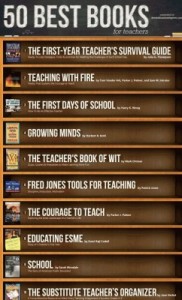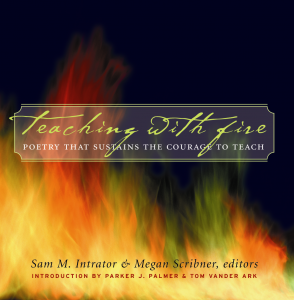Those of us who care about the young and their education must find ways to remember what teaching and learning are really about. We must find ways to keep our hearts alive as we serve our students. Poetry and this book have the power to keep us vital and focused on what really matters in life and in schooling.
Teaching with Fire is a wonderful collection of eighty-eight poems from well-loved poets such as Walt Whitman, Langston Hughes, Billy Collins, Emily Dickinson, and Pablo Neruda. Each of these evocative poems is accompanied by a brief story from a teacher explaining the significance of the poem in his or her life’s work. Parker J. Palmer and Tom Vander Ark wrote the Introduction for Teaching with Fire. See Table of Contents below.
Royalties from Teaching with Fire support leadership programs offered through the Center for Courage & Renewal.
 Teaching with Fire is #2 on Edudemic’s Top 50 Books for Teachers!
Teaching with Fire is #2 on Edudemic’s Top 50 Books for Teachers!
To Order Teaching with Fire
Jossey-Bass/ Wiley Wiley accepts school purchase orders and major credit cards. Contact Chris Hegg, chegg@wiley.com, to facilitate a price quote and for ordering information for orders of 35 books or more.
Amazon
Barnes & Noble
Books-A-Million
Indie Bound
Praise for Teaching with Fire:
Grounded in the belief that powerful schools need strong, inspired teachers, Intrator and Scribner use their call for reflection to capture the inspiration and passion that keeps teachers engaged in their profession. In so doing, they not only offer a practical set of suggestions for how teachers can and do use poetry in their work, both with students and behind the scenes, but also tap into the joys, challenges, and battles that define the life committed to teaching. – Harvard Educational Review, Winer 2004 Issue. Read the full review here.
The book as a whole fairly glows with its value, like the fire on the dust jacket. It is both an ideal companion for teachers and, for us outsiders, a wonderful window onto the emotions that are inseparable from their work. – “On Common Ground,” Yale-New Haven Teachers Institute, Number 10, Spring 2005. Read the full review here.
Is there a better way to spend a summer afternoon than swinging in a hammock with a good book? Not if that book is Teaching With Fire….a collection of poems culled specifically to inspire educators. Poems from Langston Hughes, Billy Collins, Pablo Neruda, and a host of others, including teachers, fill its pages with messages about art, creativity, purpose, and motivation. – National Education Association, Cover Story, May 2006. Read the full review here.
I am planning to give this book to my practicum teacher as a thank you gift for working with my students. I’ve come across nothing better to help inspire a future or practicing teacher to include more poetry in lesson planning. Of course, right after I decided that my practicum teacher would love this book, I had to go online and order another copy of this collection for myself! – Mrs. Deraps, Literary Strategies in Action. Read the full review here.
As we all slowly ease back into our routines after the holidays, I thought I would share a book that not only inspires other writers but involves teachers writing about their inspiration from poetry. … You will hear throughout the book talk of writer’s notebooks and poetry reads, of students and families, of joy and heartache. I promise you it will be a fresh read every time!! – Theresa Gray, Why Write? A search for the answer to this essential question. Writing Frameworks. Read the full review here.
For teachers experiencing burnout, the process involved in selecting meaningful poetry can reignite the fire within them and inspire how they teach. The editors have compiled these teachers’ stories into eight sections, organized around such issues as becoming a teacher, pressures that teachers face, the differences teachers make, and the gifts teaching brings. – Childhood Education, Winter 2004/2005 Vol. 81 [2] pp. 111-112. Read the full review here.
Are you a teacher who may need some extra encouragement? Do you know teachers who might appreciate a gift book that says “I care about what you do”? Maybe you are a parent who just wants to be clued-in to what teachers go through, or want to be able to support the educators you know. or get involved in education reform…. [Teaching with Fire] is just a wonderful, wonderful collection of poetry that has restored the faith of teachers. A good collection of poems in its own right, a wonder when seen as an ally for inspired teaching and learning. – Byron Borger, Hearts and Minds: More than a Bookstore. Read the full review here.
I keep one of my all-time favorite teaching books here at our place on the lake. It has a lovely title: Teaching with Fire: Poetry that Sustains the Courage to Teach. It’s a collection of essays written by educators at all levels. In each essay, the writer introduces a favorite poem—one with significance for that teacher’s life and work. The essays and poems are wonderfully inspirational and motivating. It’s a great book for reading along side the lake. – Maryellen Weimer, “Teaching with Style: A Unique Integration of the Personal and the Professional,” Faculty Focus, July 28, 2011. Read the full review here.
As new faculty, we were gifted with a collection of poems entitled: Teaching with Fire. I brought it home among all of the myriad of materials I received in the “new faculty orientation” and filed it on my bookshelf. I happened to pick it up recently and found several selections right on the mark for our profession and why we practice it. Sometimes we need to be able to look at our work with fresh eyes, beyond the fragments of teaching, such as meetings, paper correcting, keeping attendance and submitting grades, and toward the whole of what we do. This book may help you do that.– Mary West, “Teaching with Fire,” The IWLA Bulletin: A Newsletter for the Members of the Iowa World Language Association Volume XII No. 3 Spring 2006..
Endorsements for Teaching with Fire:
Teaching with Fire is a glorious collection of the poetry that has restored the faith of teachers in the highest, most transcendent values of their work with children . . . . Those who want us to believe that teaching is a technocratic and robotic skill devoid of art or joy or beauty need to read this powerful collection. So, for that matter, do we all. – Jonathan Kozol, author of Amazing Grace and Savage Inequalities
When reasoned argument fails, poetry helps us make sense of life. A few well-chosen images, the spinning together of words creates a way of seeing where we came from and lights up possibilities for where we might be going . . . . Dip in, read, and ponder; share with others. It’s inspiration in the very best sense. – Deborah Meier, co-principal of The Mission Hill School, Boston and founder of a network of schools in East Harlem, New York
It is said in the Confucian tradition that the mark of any golden era is that children are the most important members of a society and teaching the most revered profession. Today, fear, anxiety, overwork, and under-appreciation characterize a great many professions, but few more so than teaching. Realism tells us that the journey to regain our sanity regarding children and teaching will be a long one. Passion tells us that the path to the future is the one we tread here, now. The editors of Teaching with Fire say it is to sustain teachers. I say it is to sustain us all— for who are we at our best save teachers, and who matters more to us than the children? – Peter Senge, author, The Fifth Discipline
Table of Contents
Gratitudes
A Note to Our Readers by Sam M. Intrator and Megan Scribner
Introduction by Parker J. Palmer and Tom Vander Ark
Hearing the Call:
- Bob O’Meally’s “Make Music with Your Life” submitted by John J. Sweeney.
- Marge Piercy’s “To be of use” submitted by Katya Levitan-Reiner.
- Pablo Neruda’s “The Poet’s Obligation” submitted by William Ayers.
- Gabriele D’Annunzio’s “I pastori” submitted by Susan Etheredge.
- Emily Dickinson’s “The Chariot” submitted by Judy R. Smith.
- Lord Alfred Tennyson’s “Crossing the Bar” submitted by Marj Vandenack.
- William Stafford’s “The Way It Is” submitted by Lisa Drumheller Sudar.
- Walt Whitman’s Preface to “Leaves of Grass” [Excerpt] submitted by Lori Douglas.
- Langston Hughes’s “Dream Deferred” submitted by Heather Kirkpatrick.
- Marian Wright Edelman’s “I Care and I’m Willing to Serve” submitted by Linda Lantieri.
Cherishing the Work:
- Billy Collins’s “First Reader” submitted by Sandra Dean.
- Gary Snyder’s “Axe Handles” submitted by Curtis Borg.
- David Whyte’s “Working Together” submitted by Jani Barker.
- Marcie Hans’s “Fueled” submitted by Betsy Motten.
- William Carlos Williams’s “The Red Wheelbarrow” submitted by Sarah Fay.
- George Venn’s “Poem Against the First Grade” submitted by Theresa Gill.
- Jeff Moss’s “On the Other Side of the Door” submitted by Lamson T. Lam.
- Lydia Cortés’s “I Remember” submitted by Sonia Nieto.
- Robert Frost’s “Nothing Gold Can Stay” submitted by Troyvoi Hicks.
- Gary Blankenburg’s “The Mouse” submitted by Ellen Shull.
- Lewis Buzbee’s “Sunday, Tarzan in His Hammock” submitted by Dan Mindich.
On the Edge
- John Milton’s “Paradise Lost, Book VIII” submitted by John I. Goodlad.
- Stephen Sondheim’s “Children Will Listen” submitted by Don Shalvey.
- Al Zolynas’s “Love in the Classroom” submitted by Ron Petrich.
- Billy Collins’s “On Turning Ten” submitted by Chip Wood.
- Li-Young Lee’s “The Gift” submitted by Kelly Gallagher.
- Mary Oliver’s “The Journey” submitted by Marian Mesrobian MacCurdy.
- Yehuda Amichai’s “God Has Pity on Kindergarten Children” submitted by Shifra Schonmann.
- Jellaludin Rumi’s “The Lame Goat” submitted by Michael Poutiatine.
- Linda McCarriston’s “Hotel Nights with My Mother” submitted by Wanda S. Praisner.
- Lucile Burt’s “Melissa Quits School” submitted by Leslie Rennie-Hill.
Holding On
- Denise Levertov’s “Witness” submitted by Robert Kunzman.
- Octavio Paz’s “After” submitted by Catherine Johnson.
- Mary Oliver’s “Wild Geese” submitted by Elizabeth V. V. Bedell.
- William Butler Yeats’s “Everything That Man Esteems” submitted by Betsy Wice,
- May Sarton’s “Now I Become Myself” submitted by Amy Eva-Wood,
- Annie Dillard’s “Teaching a Stone to Talk” [Excerpt] submitted by Libby Roberts.
- David Whyte’s “Sweet Darkness” submitted by Jeanine O’Connell.
- Rubin Alves’s “Tomorrow’s Child” submitted by Sarah Smith.
- Donald Hall’s “Names of Horses” submitted by Laurel Leahy.
- Judy Brown’s “Fire” submitted by Maggie Anderson.
- Margaret Walker’s “For My People” submitted by Tracy Swinton Bailey.
In the Moment:
- Elizabeth Carlson’s “Imperfection” submitted by Glynis Wilson Boultbee.
- David Wagoner’s “Lost” submitted by Fred Taylor.
- Wendell Berry’s “A Purification” submitted by Rick Jackson.
- Marge Piercy’s “The seven of pentacles” submitted by Sally Z. Hare.
- Pablo Neruda’s “Keeping Quiet” submitted by Catherine Gerber.
- Gary Snyder’s “What Have I Learned” submitted by Perie Longo.
- Wislawa Szymborska’s “There But for the Grace” submitted by Lesley Woodward.
- Derek Walcott’s “Love After Love” submitted by David Hagstrom.
- William Stafford’s “You Reading This, Be Ready” submitted by Lucile Burt.
- Edgar A. Guest’s “Don’t Quit” submitted by Reg Weaver.
Making Contact:
- Charles Olson’s “These Days” submitted by John Fox.
- Donna Kate Rushin’s “The Bridge Poem” submitted by Debbie S. Dewitt.
- Seamus Heaney’s “The Cure at Troy” [Excerpt] submitted by Jim Burke.
- Virginia Satir’s “Making Contact” submitted by Dennis Littky.
- John Moffitt’s “To Look at Any Thing” submitted by Angela Peery.
- Jellaludin Rumi’s “Two Kinds of Intelligence” submitted by Marianne Houston.
- Adrienne Rich’s “Dialogue” submitted by Adam D. Bunting.
- Galway Kinnell’s “Saint Francis and the Sow” submitted by Libby Falk Jones.
- Maxine Kumin’s “Junior Life Saving” submitted by Thomasina LaGuardia.
- Gary Soto’s “Saturday at the Canal” submitted by Steve Elia.
- Adrienne Rich’s “Diving into the Wreck” submitted by Penny Gill.
The Fire of Teaching:
- Wislawa Szymborska’s “A Contribution to Satistics” submitted by Elizabeth Meador.
- E. Cummings’s “You Shall Above All Things” submitted by Mark Nepo.
- Mary Oliver’s “The Summer Day” submitted by Caren Bassett Dybek.
- Ranier Maria Rilke’s “Archaic Torso of Apollo” submitted by Rob Reich.
- Robert Graves’s “Warning to Children” submitted by Ali Stewart.
- Wallace Stevens’s “The Poem That Took the Place of a Mountain” submitted by Samuel Scheer.
- Langston Hughes’s “My People” submitted by Mary Cowhey.
- nikki giovanni’s “the drum” submitted by Sam Grabelle.
- nila northSun’s “moving camp too far” submitted by Tom Weiner.
- Czeslaw Milosz’s “Gift” submitted by Suzanne Strauss.
- S. Eliot’s “East Coker” submitted by Stephen Gordon.
- Naomi Shihab Nye’s “Shoulders” submitted by Marcy Jackson.
- Bettye T. Spinner’s “Harvest Home” submitted by Linda Powell Pruitt.
Daring to Lead:
- Rabindranath Tagore’s “Where the Mind Is Without Fear” submitted by Tony Wagner.
- Barbara Kingsolver’s “Beating Time” submitted by Susan Klonsky.
- Thomas Jefferson’s “Passage from a Letter to William Charles Jarvis” submitted by Theodore R. Sizer.
- Robert Herrick’s “Delight in Disorder” submitted by Edward Alan Katz.
- Rainer Maria Rilke’s “I Believe in All That Has Never Yet Been Spoken” submitted by Tom Vander Ark.
- Langston Hughes’s “Mother to Son” submitted by Joe Nathan.
- nikki giovanni’s “ego-tripping” submitted by Janice E. Jackson.
- Anne Sexton’s “Courage” submitted by Wendy Kohler.
- William Stafford’s “Silver Star” submitted by Jay Casbon.
- Walt Whitman’s “Crossing Brooklyn Ferry” [Excerpt] submitted by Sandra Feldman.
- Vaclav Havel’s “It Is I Who Must Begin” submitted by Diana Chapman Walsh.
- Marge Piercy’s “The low road” submitted by Parker J. Palmer.
Tending the Fire: The Utility of Poetry in a Teacher’s Life by Sam M. Intrator
About the Courage to Teach Program
The Contributors
The Editors


Leave a Comment